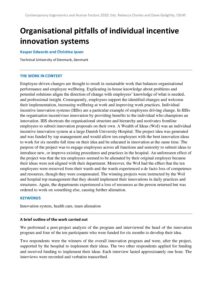| Document | Author Kasper Edwards and Christine Ipsen |
| Abstract Employee-driven changes are thought to result in sustainable work that balances organisational performance and employee wellbeing. Explicating in-house knowledge about problems and potential solutions aligns the direction of change with employees’ knowledge of what is needed, and professional insight. Consequently, employees support the identified changes and welcome their implementation, increasing wellbeing at work and improving work practices. Individual incentive innovation systems (IIISs) are a particular example of employees driving change. In IIISs the organisation incentivises innovation by providing benefits to the individual who champions an innovation. IIIS shortcuts the organisational structure and hierarchy and motivates frontline employees to submit innovation proposals on their own. A Wealth of Ideas (WoI) was an individual incentive innovation system at a large Danish University Hospital. The project idea was generated and was funded by top management and would allow ten employees with the best innovation ideas to work for six months full time on their idea and be educated in innovation at the same time. The purpose of the project was to engage employees across all functions and seniority to submit ideas to introduce new, or improve existing procedures and practices in the hospital. An unforeseen effect of the project was that the ten employees seemed to be alienated by their original employer because their ideas were not aligned with their department. Moreover, the WoI had the effect that the ten employees were removed from their wards and the wards experienced a de facto loss of competence and resources, though they were compensated. The winning projects were instructed by the WoI and hospital top management that they should implement their innovations in daily practices and structures. Again, the departments experienced a loss of resources as the person returned but was ordered to work on something else, causing further alienation. |

